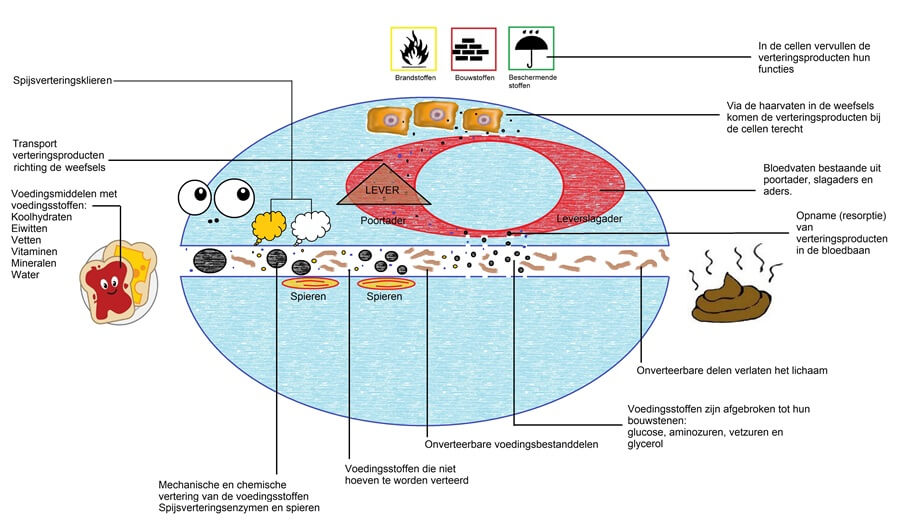
Digestion
The digestive system aims to treat the nutrients so that they enter the bloodstream via intestinal wall and transport them to our organs and body cells. Nutrition and our digestion are not only responsible for providing fuel but for our physical and emotional functioning. Many physical complaints arise from a disturbed digestive system.
Our metabolism (metabolism) is responsible for the production of enzymes – hormones – neurotransmitters – cell growth – immune system and depends on the quality of our digestion.
Many people take digestion for granted until problems occur and are actually too late. There are a few points to consider:
3.7 million Dutch people have gastrointestinal problems (RIVM)
- In 2019, 1.6 million people were prescribed prescription laxatives, the best-selling drug for 1.2 million users
- water is the best laxative use at least 1.5 liters of water per day, at summer temperatures even more, in addition to eating healthy fiber
- magnesium hydroxyde has a laxative effect and has virtually no side effects
- in 2018, 1.94 million people were prescribed antacids
- proton pump inhibitors such as Omaprazole and Pantoprazole have significant side effects: intestinal infections, kidney failure and osteoporosis (bone decalcification), affect intestinal flora
- calcium carbonate is basic and neutralises acids and can therefore help with an unregulated acidity pH balance
- Bowel cancer and esophageal cancer make up 12.8% of cancers in 2019 at number 2 after skin cancer
- antibiotics is not good for your good gut bacteria it lowers the population of healthy gut bacteria,
- safe body probiotics can replenish the population
- a normal bowel movement is 1 x daily with a fairly solid brown color, if this deviates the intestines do not work optimally. Black stool is blood; contact gp
- calcium is important for good intestinal peristalsis, it causes muscle contraction
- fatigue after lunch is caused by excessive carbohydrate intake
- flatulence that does not stink is an indication of carbohydrate intolerance
- inflammation can severely disrupt enzymatic processes and therefore digestion.
- flatulence that stinks may indicate fungal, bacterial and parasitic infection
- Most people with skin complaints have a disrupted intestinal flora
- A leaky intestine means that the filtering effect of the intestines is no longer ”fine’ enough. Not to be confused with intestinal perforation that can be life-threatening.
- Hemorrhoids are common in people with anger , pent-up anger and not being able to “let go”. Cause hemorrhoids often lies with weakened vascular walls icm poor nutrition
- white deposit on your tongue, dandruff, vaginal discharge, sugar needs, calves, flatulence “woolly” feeling in your head indicate a candida infection, candida feeds on sugars.
- fungi and parasites grow much better in an acidic environment, a good pH balance is therefore very important, fungi secrete toxic substances that can affect your brain.
- 80% of your immune system is in your gut, a healthy intestinal flora has 1.5 kg of body bacteria, which is 2 times more than the number of body cells.
- as the intestinal flakes clog up (compare this to a doormat full of sand) the absorption of nutrients in the blood becomes proportionally less
- everything we eat, swallow (including mouth, nose, throat, lung mucus that has captured harmful substances ends up in the intestines and may be cleaned up/ defused
- Bad breath can be caused by inflammation in the oral cavity or an inflamed incapacitated gastric valve between esophagus and stomach
What suits you, what do you need?
You are interested but do not know which products suit you best?
Fill in the questionnaire and we will send you a free proposal by e-mail with a brief explanation.
Since 2000 we are practicing naturopathy. We will handle your information with utmost confidentiality in accordance with privacy legislation and NEVER share this information with third parties.

